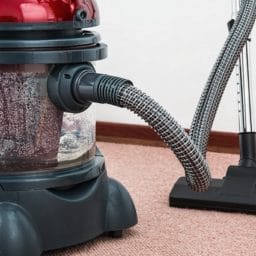Most people are aware of the risks of hearing damage from attending a live concert or shooting a firearm, but many do not know that they could be damaging their hearing in their very own home. Many household tools and appliances exceed 85 dB – the threshold of volume that is considered safe.
How Loud Is Too Loud?

OSHA warns that any sound over 85 dB can cause irreversible hearing damage after just 15 minutes of exposure. For reference, this is about the volume of highway traffic or a busy café.
According to the National Institutes for Deafness and Other Communication Disorders, 24 percent of Americans under age 70 have some level of noise-induced hearing loss.
Noise-induced hearing loss occurs when loud sounds damage the stereocilia of the inner ear. Stereocilia are tiny hair cells that convert soundwaves to electrical energy. This energy is transmitted to the brain by the auditory nerve in order to be interpreted as sound. Once these hair cells are damaged, they do not regenerate, and permanent sensorineural hearing loss is the result.
Noise Hazards at Home
A good rule of thumb is if you are unable to carry on a conversation at a normal volume over a sound source, the noise is too loud and could cause damage.
There are certain tools that come to mind as being too loud, like a leaf blower, lawn mower or table saw, but even some of the appliances inside your home can pose a hazard. See below a list of household appliances and their decibel output:
- Vacuum cleaner: 60-85 dB
- Hair dryer: 60-85 dB
- Lawn mower: 65-95 dB
- Garbage disposal: 70-95 dB
- Toilet flush: 75-85 dB
- Food processor/blender: 80-90 dB
- Garbage disposal: 80-95 dB
- Drill: 95 dB
- Leaf blower: 110 dB
- Chainsaw: 120 dB
How to Preserve Hearing
The easiest way to protect your hearing is to wear earplugs during noisy activities, especially when using power tools, but also when doing certain indoor chores. Earplugs can be custom-made at your local audiologist’s office for maximum comfort and protection, but drugstore earplugs are also cost-effective and can lower your risk of damage.
You’ll also want to make sure to keep the volume turned down on your TV, radio, headphones and earbuds to the lowest volume where you can still comfortably hear – about the same volume as normal a conversation.
Finally, as you purchase new appliances for your home, make sure to check the decibel output and purchase ones with the quietest noise level possible.
For more information or to schedule an appointment, call the The Hearing & Balance Center today!
